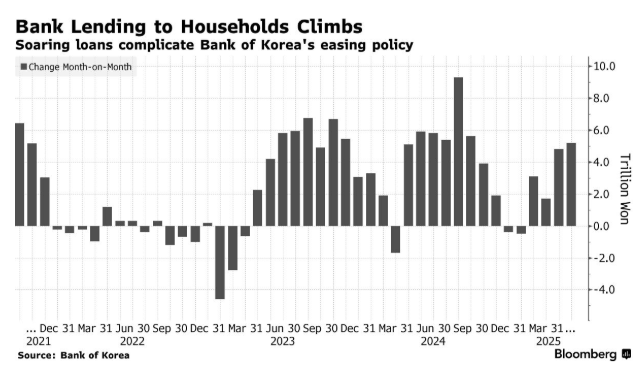The continuous rise in housing prices, especially in the Seoul metropolitan area, may accelerate South Korea’s debt accumulation and pose a risk to financial stability, threatening the financial system that has generally performed well in the face of long-term political unrest and US tariffs.
The Bank of Korea released its semi-annual financial system report on Wednesday, stating that despite increased volatility in financial and foreign exchange markets, the country’s financial system remained largely stable in the first half of 2025. During this period, political uncertainty in South Korea intensified due to the leadership vacuum following the impeachment of former President Yoon Suk Yeol and ongoing trade tensions with the Trump administration.
Meanwhile, as surging house prices and rising household debt conflict with the current interest rate cut cycle, the Bank of Korea has issued a warning on stability. This warning highlights the dilemma faced by the Bank of Korea: how to support growth amid an economic slowdown without triggering a real estate boom like those seen in previous easing cycles.
South Korean central bank governor Lee Chang-yong has repeatedly warned that overly rapid interest rate cuts could trigger a rebound in household debt.
The Bank of Korea said that the real estate markets in Seoul and other regions of South Korea are diverging – a concern it has repeatedly emphasized. While housing prices in non-capital areas have stagnated or declined, those in Seoul rose by more than 16% from January 2023 to April 2025, fueling a sharp increase in demand and speculative sentiment.

Data from South Korea’s central bank shows that the country’s housing price outlook index jumped to its highest level since October 2021 (the most recent period of real estate boom) in June. The index has risen for four consecutive months.
The Bank of Korea also pointed out that the delinquency rate of borrowers, especially small businesses, has been on the rise, which has become an increasingly worrying issue for non-bank lending institutions. Although systemic risks remain manageable, the Bank of Korea emphasized the need to enhance coordination between monetary policy and macroprudential policy.
South Korea’s banks extended the biggest increase in household loans in nine months, a growth that has intensified concerns over the rising debt of the central bank and financial regulators as policymakers assess how much support to provide to the weakening economy.
Data released by the Bank of Korea on Wednesday showed that total loans rose by 5.2 trillion won (about 3.8 billion US dollars) in May, marking the largest increase since September 2024. Housing loans also saw the biggest increase in nine months.
In May, loans rose by 4.1% compared with the same period last year, marking the third consecutive month of growth above 4%. Although the year-on-year growth rate was slightly lower than that of the previous two months, it remains a cause for concern as it has consistently exceeded inflation.
The Financial Services Committee held a meeting on Wednesday to discuss the growth of household debt and housing loans, and stated that it would significantly strengthen the regulation of mortgage loans.
Park Min-chul, senior manager of the Financial Markets Department at the Bank of Korea, said at a press conference on Wednesday: “We will maintain a loose stance to deal with the economic slowdown, while closely monitoring the market to ensure that the increase in liquidity does not trigger expectations of rising house prices or further accelerate household debt.”
Economists are also concerned about the growth of debt. Nomura Holdings Inc. and United Overseas Bank Ltd. have both pushed back their forecast for another 25 basis point rate cut to the last quarter of this year, citing increased risks to financial stability.


